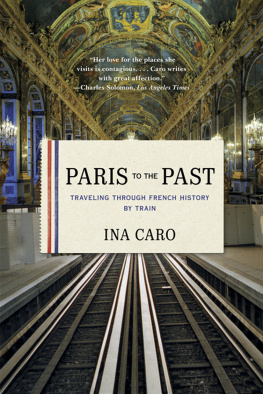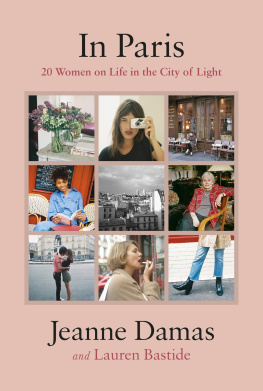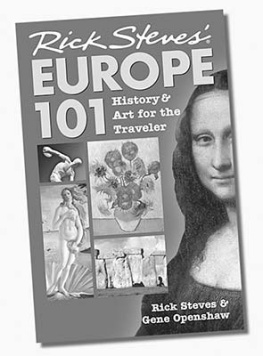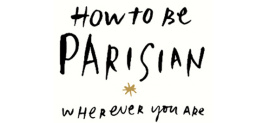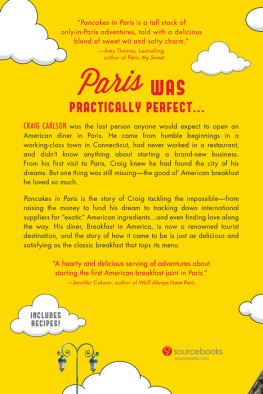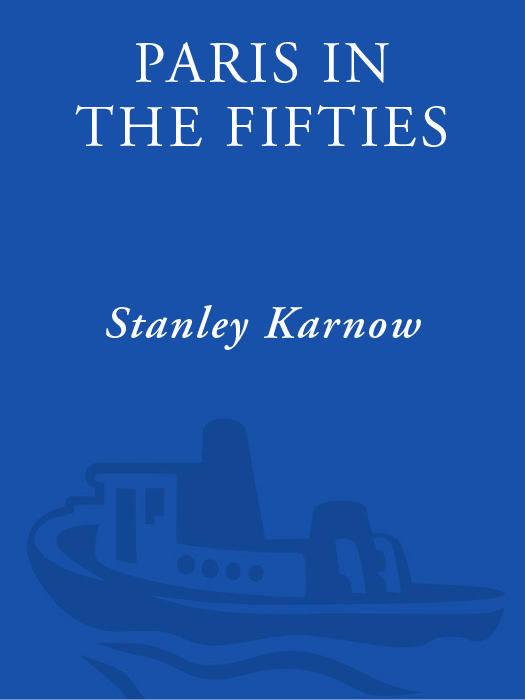Also by Stanley Karnow
In Our Image: Americas Empire in the Philippines
Vietnam: A History
Mao and China: From Revolution to Revolution
Southeast Asia
Copyright 1997, 1999 by Stanley Karnow
All rights reserved. No part of this book may be reproduced or transmitted in any form or by any means, electronic or mechanical, including photocopying, recording, or by any information storage and retrieval system, without permission in writing from the publisher.
Published by Three Rivers Press, New York, New York. Member of the Crown Publishing Group.
Random House, Inc. New York, Toronto, London, Sydney, Auckland www.randomhouse.com
THREE RIVERS PRESS is a registered trademark and the Three Rivers Press colophon is a trademark of Random House, Inc.
Originally published in hardcover and in slightly different form by Times Books in 1997.
Library of Congress Cataloging-in-Publication Data Karnow, Stanley.
Paris in the fifties / Stanley Karnow.
1. Karnow, StanleyHomes and hauntsFranceParis. 2. Paris (France)Social life and customs20th century. 3. FrancePolitics and government1945. 4. National characteristics, French. I. Title.
DC715.K38 1997
944.36082dc21 97-18521
eISBN: 978-0-307-76151-4
v3.1
For Dru and Frank White
Ask the traveled inhabitant of any nation, in what country on earth would you rather live? Certainly in my own. Which would be your second choice? France.
T HOMAS J EFFERSON
Preface
D uring the 1950s, when I worked as a Time correspondent in Paris, it was standard operating procedure to swamp the editors back in the New York office with voluminous, detailed and often remarkably authoritative reports that they would boil down to a few glossy paragraphs. The process, combined with its anonymity, frequently frustrated me. The result, however, was an enormously successful magazine, and, like the other members of the bureau, I accepted the system. After all, I was enjoying myself in a beautiful city while learning the journalistic trade. But, on the odd chance that they might eventually turn out to be useful, I saved the carbon copies of my original dispatches. A chronicle rather than a memoir, this book contains, in greatly revised form, a selection of those that may evoke the atmosphere of the period and also provide some insights into French life four decades ago. France has evolved dramatically since then; yet to a large extent, as the old saying goes, Plus a change, plus a reste la mme chosewhich is, for me, one of its most appealing traits.
I am deeply indebted to Lalaine Estella, my research assistant, who diligently assembled, classified and computerized the thousands of pages I had accumulated. Frank White, Dru White and Anne Chamberlin, my Time associates in those bygone days, shared their recollections with me. My old and close friend Andr Wormser read the manuscript and furnished me with valuable comments. I also relied in various ways on R. W. Apple, Jill Brett, Joan Bingham, Christian Chapman, Jean Daniel, Timothy Foote, Burt Glinn, Stanley Hoffmann, Anne Lowenstein, Michael Macrone, Marc Menguy, Claude Moisy, Mark Pratt, Christopher Ogden, Grant Reynolds, James Trager, Henri de Turenne, Catherine Van Moppes and the late Nicholas Wahl. Many of my colleagues, both French and American, indirectly assisted me over the years, and they may recognize their contributions in these chapters. Franoise Champey corrected my French. Sybil Pincus skillfully steered the book through the production process, Naomi Osnos was responsible for its gracious design, and Diana Marsh did a fine job of copyediting. I am grateful to Robert Barnett, my agent, for his services. My thanks as well to Peter Osnos, the former president of Times Books, for his initial encouragement. Every writer needs an editor, and Geoff Shandler patiently offered me his guidance from start to finish.
As usual, I depended for advice on my childrenCurtis, Marilyn Englander, Catherine and Michael. Above all, my wife, Annette, deserves my gratitude. Not only did she adorn the book with her illustrations, but her memories of Paris refreshed my own.
S.K.
P OTOMAC , M ARYLAND
A PRIL 1997
Contents
1
Pourquoi Paris
T housands of young Americans were flocking to Europe after World War II, and I joined the throng. Late in June 1947, fresh out of college, I went to Paris, planning to stay for the summer. I stayed for ten years.
Pourquoi Paris? Its name alone was magic. The city, the legendary Ville Lumire, promised something for everyonebeauty, sophistication, culture, cuisine, sex, escape and that indefinable called ambience. When good Americans die they go to Paris, ran Oscar Wildes oft-quoted quip. That was certainly not my purpose in going there, but then, what was it? Perhaps, simply, Paris.
Modern European history and literature had been my major at Harvard, and my courses on France had acquainted me with the ancien rgime and the Enlightenment, the Revolution, the Napoleonic era, the Third Republic and, most recently, the valiant Resistance during the German occupation. I had grappled with the works of Molire, Racine, Descartes, Voltaire and les philosophes, Hugo, Flaubert, Stendhal, Balzac, Maupassant, Baudelaire, Verlaine, Rimbaud, Zola, Gide, Proust and postwar intellectuals like Jean-Paul Sartre, Simone de Beauvoir and Albert Camus. Dabbling in art had left me with some notions about Monet, Manet, Degas, Van Gogh, Toulouse-Lautrec, Picasso, Braque, and the Surrealists and Dadaists. I had been enchanted by such French film classics as La Grande Illusion, La Femme du Boulanger and Les Enfants du Paradis, and knew the songs of Maurice Chevalier and Charles Trenet by heart. Along with the rest of my generation, I had read Hemingway, Fitzgerald and smuggled copies of Henry Millers salacious novels, and dreamed of retracing their footsteps through Montparnasse, Saint-Germain-des-Prs and the boulevard de Clichy. I was further gulled by the real or exaggerated recollections of GIs and their doughboy fathers of compliant French womenthe eternal Mademoiselle from Armentires.
Air travel was then expensive, and most of us crossed the Atlantic by ship, usually third class. My friend and fellow Harvard Crimson editor, Anthony Lewis, the future New York Times columnist, wangled us passage for fifty dollars each aboard a coal freighter bound for Le Havre. I stuffed some clothes and a supply of Camels into a rucksack and my old army duffel bag, and we sailed from Baltimore. We had been at sea for a week, idly reading and playing chess, when a radiogram advised the captain that a strike had paralyzed Le Havre and ordered the ship to Rotterdam. Both German and Allied bombing had leveled the city. I had served during the war in India and China, agricultural lands that were spared such destruction, and the scene as we docked stunned me. But it was only a prelude to the devastation I would witness elsewhere in Europe.
Tony and I proceeded by train to Paris and made our way to the Lutce, a Latin Quarter hotel that had been recommended to us. Situated near the Sorbonne, it was cheap, apparently cleanand primitive. My little room opened onto an air shaft and contained a narrow bed, a wobbly table, a tiny armoire and a feeble lightbulb. The toilet next door leaked, the smell of greasy cooking permeated the premises, and from somewhere upstairs came the mournful tones of someone practicing the saxophone. The two French students on the floor greeted me warmly, and, though my French was fractured, we managed to communicate. One of them, Hubert Doucet, was a dapper bon vivant with a silky goatee, whose affluent peasant parents deluged him with weekly parcels of butter, cheese, hams and pts, which in those days of acute food shortages made him irresistible to girls. The other, Jean-Yves Gory, attended the cole des Langues Orientales. The son of


